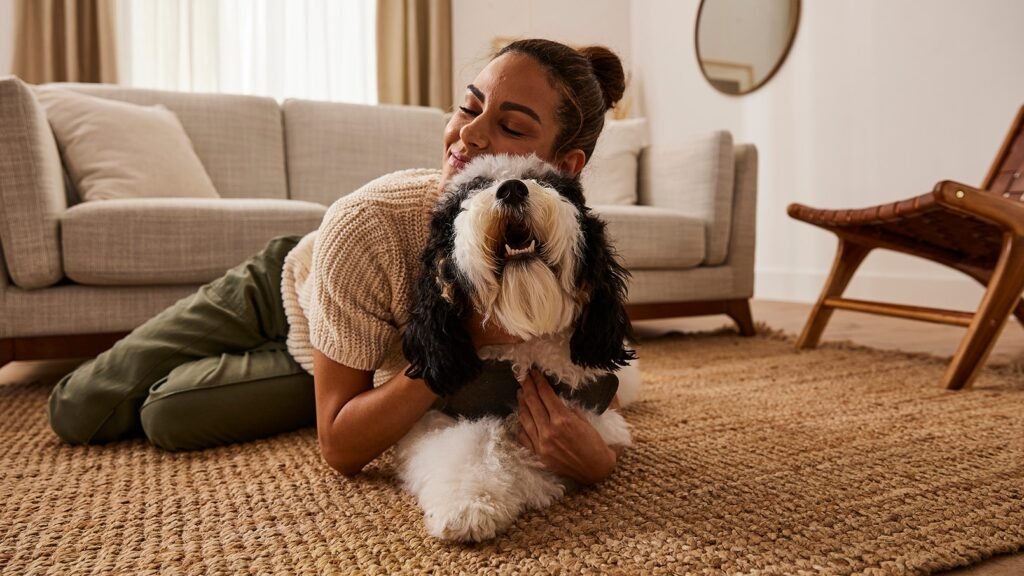Dogs bark to communicate, but what exactly are they trying to say?
If your dog has ever gone off at a squirrel, the mail carrier, or what seems like nothing at all, you’ve probably asked yourself: Why do dogs bark?
Barking might be frustrating at times, but it’s actually a totally normal part of dog behavior—and a key way dogs communicate with us and their environment.
But not all barking is created equal. Here’s what might be behind your dog’s barking, when to worry about it, and what you can do to help manage the noise.
Jump to section
Why Do Dogs Bark?
Barking is a main form of communication for dogs, and depending on the situation, it can mean several things.
Dogs might bark to express excitement, alert their parents to something unusual, or signal distress, says Bethany Hsia, DVM, co-founder of CodaPet in Clovis, California. For example, a dog might bark when they see a stranger approaching the house or when they want to play.
Here are some of the most common reasons dogs bark:
Territorial Behavior
Dogs bark to defend their territory. This behavior is instinctual and can manifest as barking at passersby, other animals, or even noises they perceive as threats, according to Dr. Hsia.
Fear or Alarm
Dogs may bark when they hear or see something unfamiliar.
Just like with humans, loud noises, sudden movements, or unfamiliar people or pets can make your dog feel threatened, and they might bark in response. This is often protective behavior to alert their family to a potential intruder or disturbance, according to Samuel Varon, DVM, owner of Broadway Veterinary Hospital, in Sacramento, California.
Greeting
Dogs may also bark as a greeting. Typically, an excited bark is associated with other friendly behaviors, such as a wagging tail.
Playing and Excitement
Dogs may bark excitedly as part of their playful behavior with other dogs or humans, says Dr. Hsia.
Attention-Seeking
Dogs are very smart, and they can pick up on cues pretty easily. Over time, some dogs learn that they can bark to get what they want, whether that’s a treat, a walk, or just eye contact. As such, your dog might start barking as a way to get attention.
Boredom or Loneliness
Dogs are social animals. Dogs left alone without mental or physical stimulation may bark out of frustration or boredom, which can be a sign they need more attention or activity, says Dr. Varon.
Puzzle toys, like the KONG Classic or Outward Hound Hide-a-Squirrel, can help keep them stimulated when they’re alone or you’re busy.
Recommended Products

Rated 4.5 out of 5 stars
4.5
6.3KReviews
$7.99Chewy PriceAdd to Cart

Outward Hound Hide A Squirrel Squeaky Puzzle Plush Dog Toy, Small
Rated 4.4 out of 5 stars
4.4
3.8KReviews
$9.99Chewy PriceAdd to Cart
Separation Anxiety
Relatedly, dogs may bark due to separation anxiety—a condition in which they become overly stressed if their primary caregiver leaves the home. If your dog barks as you’re leaving, it could be a sign of separation anxiety.
Typically, this is coupled with other signs of anxiety, such as pacing, destructive behavior, or accidents in the house.
Medical Issues
Pain, cognitive decline (especially in senior dogs), or hearing loss can sometimes lead to excessive barking. If your dog’s barking seems out of character or has suddenly increased, check in with your vet, says Dr. Hsia.
What Should I Do About My Dog’s Barking?
Some barking is a totally normal part of being a dog. But in other cases, it can be a sign that something’s off and there’s an underlying issue that needs to be addressed.
According to Dr. Hsia, normal barking typically includes occasional barks in response to stimuli such as doorbells or visitors, or during playtime. It’s usually situational and not excessive in frequency or duration.
On the other hand, problematic barking occurs when it becomes excessive and disruptive. For example, when excessive barking leads to complaints from neighbors, this can be problematic.
Here’s a quick guide to help you figure out when you should be concerned:
| Barking Behavior | What It Usually Means | Should I Worry? |
|---|---|---|
| Barks when someone’s at the door | Territorial alerting | Normal |
| Barks when left alone for long periods | Separation anxiety or boredom | May need attention |
| Barks during play | Excitement | Normal |
| Barks when you get home | Greeting | Normal |
| Barks at everything during walks | Reactivity or fear | May need attention—worth exploring training options |
| Barks more at night | Anxiety or confusion | Talk to your vet if frequent |
| Barks while sleeping | Dreaming | Normal |
| Barks excessively with no clear trigger | Medical issue or cognitive decline | Make an appointment with your vet |
How To Get a Dog To Stop Barking
If your dog’s barking is disruptive, it’s worth taking steps to address it and train them not to bark. Here’s what to do (and what not to do).
Do:
- Identify the cause. Barking is unlikely to stop until you identify the underlying cause. Try to observe what’s causing the barking and minimize exposure to those triggers, says Dr. Hsia.
- Redirect their attention. A simple “sit” command or puzzle toy, like the Frisco Two-Tier Puzzle, can shift their focus.
Recommended Product

Frisco Two Tier Interactive Puzzle Dog Toy, Level 1
Rated 4.4 out of 5 stars
4.4
269Reviews
$13.99Chewy PriceAdd to Cart
- Teach commands. Teach your dog commands such as “quiet” using positive reinforcement techniques, like treats, when your dog stops barking on command.
Recommended Product

American Journey Peanut Butter Recipe Grain-Free Oven Baked Crunchy Biscuit Dog Treats, 8-oz bag
Rated 4.5 out of 5 stars
4.5
11KReviews
$3.99Chewy PriceAdd to Cart
- Exercise your dog. A tired dog is a quiet dog. Regular physical activity or mental exercises can reduce boredom-related barking by tiring the dog out, says Dr. Hsia.
Recommended Products

Frisco Comfort Padded Dog Leash, True Navy, Small
Rated 4.7 out of 5 stars
4.7
471Reviews
$6.60Chewy PriceAdd to Cart
Out of Stock
Frisco Chewy Fetch Squeaky Tennis Ball Dog Toy, Medium, 3 count
Rated 4.3 out of 5 stars
4.3
381Reviews
$5.99Chewy Price
- Use positive reinforcement. Reward quiet behavior with praise or treats.
- Consult a professional. If barking is persistent or anxiety-based (and all else fails), Dr. Varon recommends speaking to your veterinarian or a certified dog trainer or behaviorist.
Don’t:
- Yell or punish. Punitive measures such as yelling can increase anxiety and worsen the problem rather than solve it, according to Dr. Hsia.
- Use a bark collar. These can cause fear and don’t address the root cause.
- Ignore underlying issues. Excessive barking may signal a medical or behavioral problem that needs professional attention, so Dr. Varon says it’s important to pay attention to any changes in your dog’s health or behavior and visit your vet, if needed.
FAQs About Dog Barking
Q: Why do dogs bark at nothing?
A: It might seem like your dog is barking at nothing, but dogs can smell and hear things that humans can’t. Likely, your dog is barking for one of the common reasons listed above.
Q: Why do dogs bark in their sleep?
A: Dogs often bark in their sleep during the REM (rapid eye movement) phase of their sleep cycle. This is when dreaming occurs, and the barking is likely a response to whatever they’re “experiencing” in their dreams. It’s typically harmless and not a cause for concern unless it’s frequent and disruptive, says Dr. Varon.
Q: Why do dogs bark at other dogs?
A: When dogs bark at other dogs, it can stem from a variety of reasons, including excitement, fear, territorial instincts, or social signaling. A dog might bark out of excitement when seeing another dog but could also bark defensively if feeling threatened by an unfamiliar dog’s sudden presence, says Dr. Hsia.
Q: Why do dogs bark at people?
A: It depends! They might be excited, trying to protect their territory, or unsure about a human they’ve never met before. Your dog’s body language can give additional clues. For example, tail-wagging may be accompanied by a happy bark, while a tucked tail could indicate fear.













